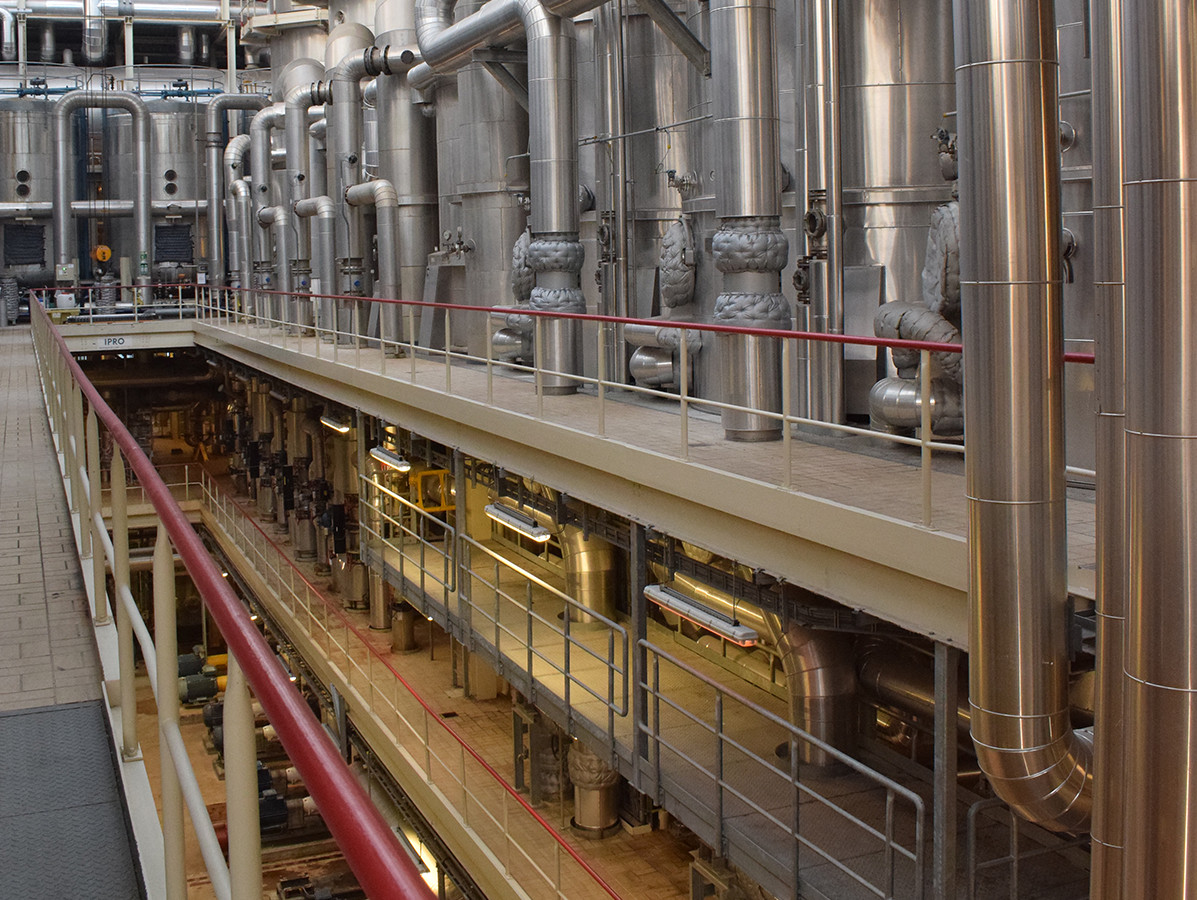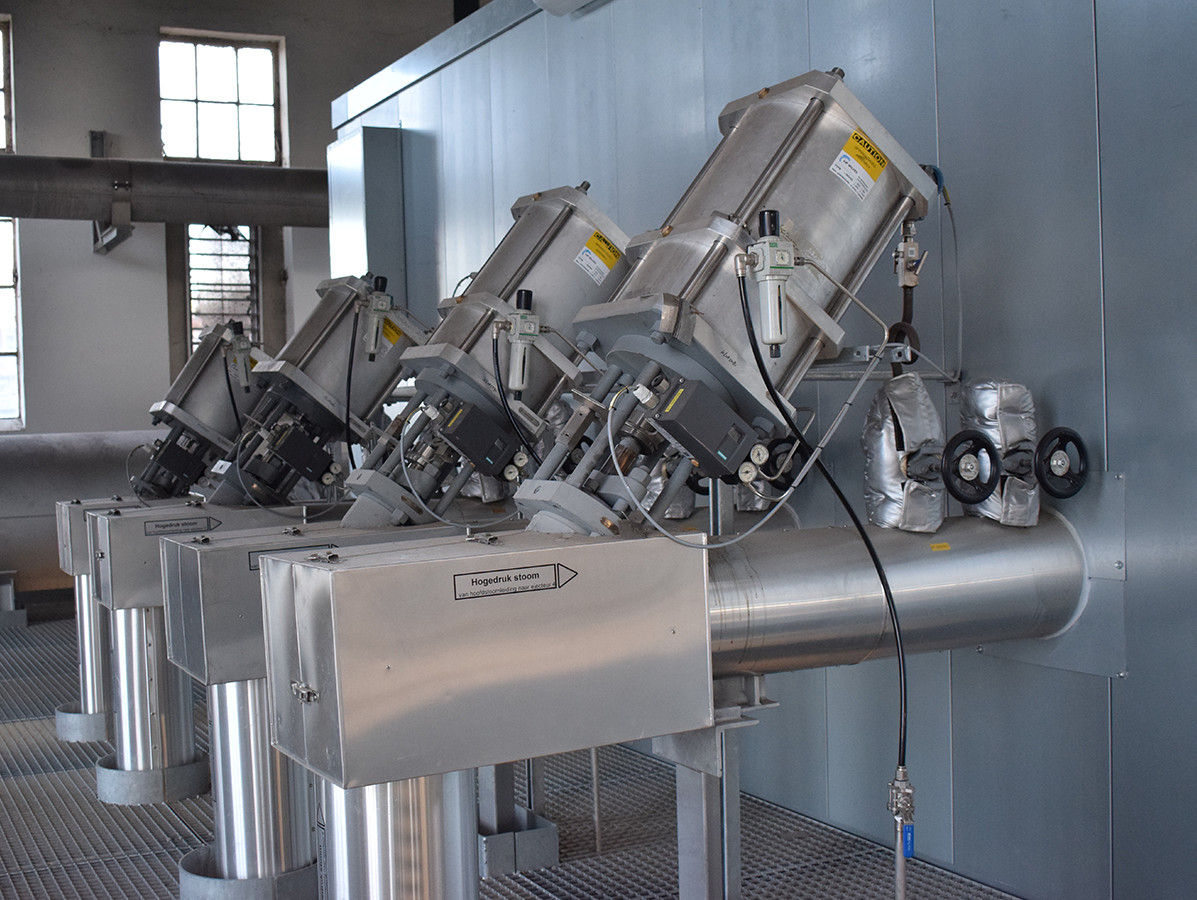
Royal Cosun is raising its climate targets and going beyond the norm. The agro-industrial cooperative states that its subsidiaries must be CO2 neutral by 2050. 'Subsidies will help us achieve our ambitious targets.'
Royal Cosun recently installed a thermal vapour compressor at its subsidiary Suiker Unie. How does the innovation contribute to CO2 neutrality? "We capture the surplus steam in our industrial processes and use it again,' says Marc van Dijk, Process Modelling & Energy Cluster team leader at Royal Cosun. Royal Cosun has now patented the thermal vapour compressor for Suiker Unie.
Edward Dorst, Manager Engineering at Suiker Unie's factory in Dinteloord, sees in practice how innovations contribute to the energy-saving targets: "Even before the thermal vapour compressor, we were already pursuing those targets, for example with our multi-stage evaporation process. Suiker Unie processes about a thousand trucks of sugar beet every day from September to January. Diffusion is used to extract the sugar juice from the beet. We purify that juice and evaporate it into thick juice, which we then crystallize into sugar. The evaporation process consists of several phases or 'stages'. We use the energy from steam to evaporate. For each stage we use that steam again. As early as 2016, we switched from a six-stage to a seven-stage evaporation process, making the process even more efficient. We saved 14 percent on the energy demand of the process". A wonderful result, according to Marc van Dijk: "Because the most sustainable energy in the world is the energy you don't use".
"The thermal vapour compressor is the next step in the drive to save energy," Marc continues. "It is the result of our research into energy savings and losses. Suiker Unie still lost a considerable amount of residual heat despite the major savings made by the seven-stage evaporation process. Thanks to the thermal vapour compressor, that loss is now almost nil. To get the sugar out of the sugar beet, a certain amount of water has to evaporate from the beet. "We put the energy from the vapor that is created when the thick juice evaporates back into the process. However, certain factors - such as varying outside temperatures and different sugar levels per beet - cause fluctuating energy requirements. It is difficult to set up the process to cope with this, which sometimes means that we have more vapour than we can directly reuse. Traditional systems cool that vapour away; that's what we call 'condenser loss'. We have now installed thermocompressors - so-called 'ejectors' - which are driven by the energy of the high-pressure steam. We bring the low-pressure residual steam back to a higher pressure and temperature and we can then reuse that steam in the process".

Royal Cosun's research & development department also studied other ways of upgrading the residual steam: 'Because of the variable amount of residual steam, the thermal vapour recompressor is the best option. Sometimes we want to recompress 3 tonnes and the next time 45 tonnes of steam. Systems other than these cannot cope with that fluctuation". The thermal vapour compressor cost around 2.5 million euros. "A major investment," Marc confirms. "And also an exciting one, because when the steam turbine breaks down, the whole factory is at a standstill. Fortunately we were eligible for the subsidy Demonstration Energy and Climate Innovation (DEI+); for this project an amount of about 800,000 euros. And because the recompressor saves a lot of energy, the project is also eligible for the Energy Investment Deduction (EIA)". "Financially, we save about half a million euros a year," Edward says.
Marc continues: "We focus on the future with this machine. In 2017 alone, we saved around 4 million cubic metres of gas and reduced CO2 emissions by 7,000 tonnes. The steam we use for the thermal vapour compressor is taken from our own steam turbine. The energy that we no longer generate ourselves now comes from elsewhere. Nevertheless, a net CO2 reduction of about 2,200 tons remains. Partly due to the energy transition where the Netherlands is currently situated in, this will only become more in the future".
"The climate targets are a good motivator for the industry to implement CO2-reducing measures. We have set ourselves a more ambitious target," says Marc. "At Suiker Unie we are already achieving almost 60% CO2 reductions compared with 1990. We are well ahead of the national climate target of a 49 per cent reduction in CO2 emissions by 2030. Our aim is to achieve a 75% reduction in CO2 emissions by 2030 and to be completely climate-neutral by 2050. Royal Cosun is now doing a lot of research for that purpose. "The Suiker Unie factory in Groningen will move from a seven-stage to an eight-stage evaporation system in 2021 but we are also investigating the possibilities of CO2-reduction measures at other subsidiaries such as Aviko and Sensus. The subsidies made available by the government shorten our payback period and make it more attractive to invest in innovative processes. So much more is technically feasible in the future. We want to stay in line with the latest developments".
This scheme is specifically designed to promote the sustainable use of raw materials. The central government has released 44 million euros for this purpose.
Conditions: Projects must aim for a higher quality or longer use of raw materials. These projects must be CO2-reduced and have an energy and financial benefit for the user. Think for example of recycling and reuse of waste. Or the use of biobased raw materials.
DEI+: Circular Economy is intended for industry, companies in the energy supply, water companies and waste managers. Your project is eligible if you want to demonstrate a new innovative technique or a new product. Proposals from SMEs are more than welcome. Applications for DEI+ Circular Economy can be submitted until 22 September 2020 (no later than 18.00 hours).
This subsidy is specifically intended to shorten the payback period of CO2-reducing investments. The central government has released 28 million euros for this subsidy.
Conditions: Projects must in any case revolve around the themes of 'energy efficiency', 'recycling' or 'reuse of waste'. It must involve investments in proven measures, with a payback period for the investment costs of more than five years. And the application of the project must be ready for the market. This means that the application must be proven at least three times in comparable projects in Dutch industry. Applications for VeKI can be submitted to RVO.nl until 30 June 2020 (no later than 17.00 hours).
This scheme is specifically designed to support integrated solutions that contribute to the climate targets. The central government has released 65 million euros for this subsidy, of which 17 million euros are specifically for industrial solutions.
Conditions: Projects eligible for the MOOI scheme must have a substantial financial volume. The exact size is yet to be determined. In addition, the project must clearly have an integral approach. For this reason, several companies in the innovation chain must be affiliated to the project. These are preferably organisations from different disciplines and consortia. It is also important that applicants draw up clear milestones in their plan. These must be SMART (Specific, Measurable, Acceptable, Realistic, Time-bound), so that progress can be closely monitored.
RVO.nl helps you further. Via its subsidy and financing guide you will immediately find out which subsidy for CO2 reduction your organisation is eligible for. You will also see how you can make use of RVO.nl's knowledge and network.
By 2050, the Netherlands will have to emit 95 percent less CO2 compared to 1990. By 2030 there should already be a 49 percent reduction. That is stated in the climate targets. On the basis of these targets, the government imposes requirements on industrial companies. It supports them in meeting those requirements - with knowledge, networks and subsidies.
New subsidies
Through the Rijksdienst voor Ondernemend Nederland (RVO.nl) it offers various new subsidies. Unique and one-off are the subsidies Demonstration Energy and Climate Investment (DEI+): Circular Economy and the Accelerated Climate Investment Industry (VeKI). These subsidy schemes contribute to the accelerated achievement of the CO2 reduction targets of 2030. In 2020, a whole new type of scheme will also open, supporting innovative integrated solutions for industry: the Emission-Driven Research Development and Innovation (MOOI) scheme.
Photos: © Royal Cosun
Source: © Vakblad Voedingsindustrie 2020